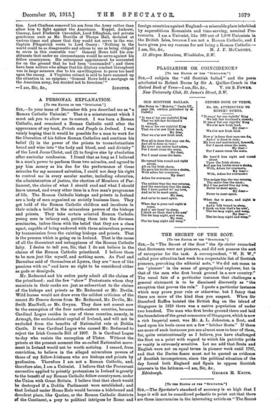A PERSONAL EXPLANATION.
"TO THE EDITOR O➢' THE "SPECTATOR."' SIR,—In your issue of December 6th you described me as "a Roman Catholic Unionist." That is a misstatement which I must ask you to allow me to correct. I was born a Roman Catholic, and remained a Roman Catholic until after the appearance of my book, Priests and People in Ireland. I was vainly hoping that it would be possible for a man to work for the liberation of his fellow Roman Catholics and continue his belief (1) in the power of the priests to transubstantiate bread and wine into " the body and blood, soul and divinity " of the Lord Jesus Christ, and (2) to forgive sins by absolution after auricular confession. I found that as long as I believed in a man's power to perform these two miracles, and agreed to pay him money as his due for the performance of these miracles for my assumed salvation, I could not deny his right to control me in every secular matter, including education, the administration of justice, the election of Members of Par- liament, the choice of what I should read and what I should leave unread, and every other item in a free man's programme of life. The Roman Catholic bishops and priests in Ireland are a body of men organized on strictly business lines. They get hold of the Roman Catholic children and inculcate in their minds a belief in the miraculous powers of the bishops and priests. They take certain selected Roman Catholic young men in infancy and, putting them into the diocesan seminaries, imbue them with the belief that they are a class apart, capable of being endowed with these miraculous powers by transmission from the existing bishops and priests. That is the process which is going on in Ireland. That is the cause of all the discontent and unhappiness of the Roman Catholic laity. I desire to tell you, Sir, that I do not believe in the claims of the Roman Catholic priesthood. I believe them to be men just like myself, and nothing more. As Paul and Barnabas said of themselves at Lystra, they are " men of like passions with us," and have no right to be considered either as gods or demigods.
Mr. Redmond and his entire party admit all the claims of the priesthood : and the few "show " Protestants whom they maintain in their ranks are just as subservient to the claims of the bishops and priests as Mr. Redmond or Mr. Devlin. Wild horses would not draw even the mildest criticism of the recent Ne Temere decree from Mr. Redmond, Mr. Devlin, Mr. Swift MacNeill, or Mr. Gwynn. They dare not assent now to the exemption of the four north-eastern counties, because Cardinal Logue resides in one of these counties, namely, in Armagh, the ecclesiastical capital of Ireland, and will not be excluded from the benefits of Nationalist rule at Dublin Castle. It was Cardinal Logne who caused Mr. Redmond to reject the Irish Councils Bill of 1907. It is Cardinal Logue to-day who resists the exemption of Ulster. Without the priests at the present moment the so-called Nationalist move- ment in Ireland would not be worth noticing. I ceased, from conviction, to believe in the alleged miraculous powers of those of my fellow-Irishmen who are bishops and priests by profession. Therefore I am- not a Roman Catholic, and, therefore also, I am a Unionist. I believe that the Protestant corrective applied to priestly pretensions in Ireland is greatly to the benefit of my Roman Catholic fellow-countrymen, under the Union with Great Britain. I believe that that check would be destroyed if a Dublin Parliament were established ; and that Ireland under Home Rule would become a hidebound and decadent place, like Quebec, or the Roman Catholic districts Of the Continent, a prey to political intrigues by Rome and foreign countries against England—a miserable place inhabited by superstitious Romanista and time-serving, nominal Pro- testants. I am a Unionist, like 999 out of 1,00 Unionists in the British Isles, because I am not a Roman Catholic, and I have given you my reasons for not being a Roman Catholic.—










































 Previous page
Previous page